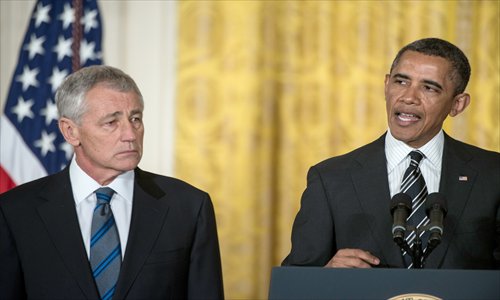Kerry, Hagel set to lead ‘cautious’ policy

US President Barack Obama was formally sworn in for a second term on Monday. The confirmation hearing process for two key cabinet positions of Obama's second term is also expected to start in the coming weeks, with Senator John Kerry nominated for Secretary of State, and former Senator Chuck Hagel named Secretary of Defense.
Obama's pick of Kerry and Hagel, two Vietnam veterans known for their cautious attitudes on the use of US military force abroad, is spurring discussions about a possible shift of US defense strategy and foreign policy in Obama's second term.
Time magazine even said that Hagel's appointment "signals the end of 20 years of interventions that began with Somalia and ended with Iraq and Afghanistan."
Analysts say the nomination of Kerry and Hagel, if confirmed, is a strong indication that the US foreign and defense policy will shift toward caution and less military adventurism. But such a shift will be strongly challenged by the situation in the Middle East and conservatives at home.
Emphasis on covert warfare
Hagel is one of the most vocal critics of the Iraq war, once calling former US President George W Bush's handling of the war "beyond embarrassing." He also declared his opposition to a military strike on Iran several times during Bush's presidency.
Kerry, similarly, also once said his decision to vote for the Iraq war was a mistake based on faulty intelligence. And they both opposed the Bush administration's troop surge in Iraq in 2007.
Hagel and Kerry' cautious perspectives on military intervention might have been shaped when they were soldiers in Vietnam.
Obama particularly cited Hagel and Kerry's Vietnam experience when announcing their nominations, saying they understand that "sending young Americans to fight and bleed in the dirt and mud is something we only do when it's absolutely necessary."
"Kerry and Hagel focus heavily on diplomacy. They seem to believe that the route to solving conflict is through dialogue with friends and enemies alike," Lawrence Haas, a senior fellow at the American Foreign Policy Council told the Global Times. "With his picks of Kerry and Hagel, Obama has sent a strong signal that he'll be reluctant to send US troops abroad and that he plans to focus on 'nation building at home.'"
Compared to the use of military intervention in Afghanistan and Iraq, the Obama administration's policy in Libya, Syria and the most recent case, in Mali, tends to reflect the indirect tactic of intervention.
"A more cautious foreign policy is already well under way. If anything, the appointment of Hagel confirms that the Obama administration is committed to staying on the path that it set out for itself early in the first term," David Mislan, an Assistant Professor of the School of International Service with the Washington DC based American University, told the Global Times.
In the future, the US is likely to put more emphasis on "covert warfare."
Mislan said that while the wars in Iraq and Afghanistan are closing, US intervention continues through the use of drones and special operations. "There is no indication that the Department of Defense under Chuck Hagel would stray from this strategy," he added.
Exception case
But the cautious policy is faced with immediate challenges, analysts say, and one the most pressing one would be the Syrian conflict, which risks spilling into neighboring countries, specifically Jordan, Iraq and Turkey.
"I believe that for a variety of reasons, the foreign and security policy of Kerry and Hagel will try to keep American armed forces out of Syria," Robert Kennedy, a former foreign affairs officer with the US Arms Control and Disarmament Agency and Professor atthe Sam Nunn School of International Affairs of the Georgia Institute of Technology, told the Global Times.
"There is little certainty at this point that any direct US military intervention would result in a stabilized Syria. So the situation in that country suggests US policies be driven by caution and prudence," he added.
But an exception might occur if the Syrian government uses chemical weapons, which the US has said repeatedly is a "red line," according to Mislan.
"If crossed, in that case, the Obama administration would be faced with a tough choice, to intervene militarily in a civil war where there is no clear consensus on the national interest or go back on its word. Either choice seems unappealing," he said.
Defense budget battle
The other challenge is for Hagel. If Hagel's nomination is confirmed, there is speculation that he will also seek to downsize the Pentagon and cut the defense budget to promote his new strategy.
Hagel is believed to be a fiscal conservative. He said to the Financial Times in a 2011 interview that the US Defense Department is "bloated" and "I think the Pentagon needs to be pared down."
"Hagel is the right person to oversee such efforts, trimming programs that have more relevance to past wars and adding as necessary to those programs more tailored to future threats and challenges," Kennedy said.
Hagel demonstrated his financial capability when he took over the United Service Organization after its bankruptcy in 1987 and then led it into profit in the same year as CEO by cutting staff and giving raises to those who remained.
But his task at the Pentagon will obviously be more challenging.
Mislan said it's very unlikely that Hagel will be able to reduce the Pentagon budget.
"Not only would Hagel and the Obama administration have to win over hawkish Republicans, but he would also have to convince members of Congress from both parties that represent areas that benefit economically from defense spending," he noted.